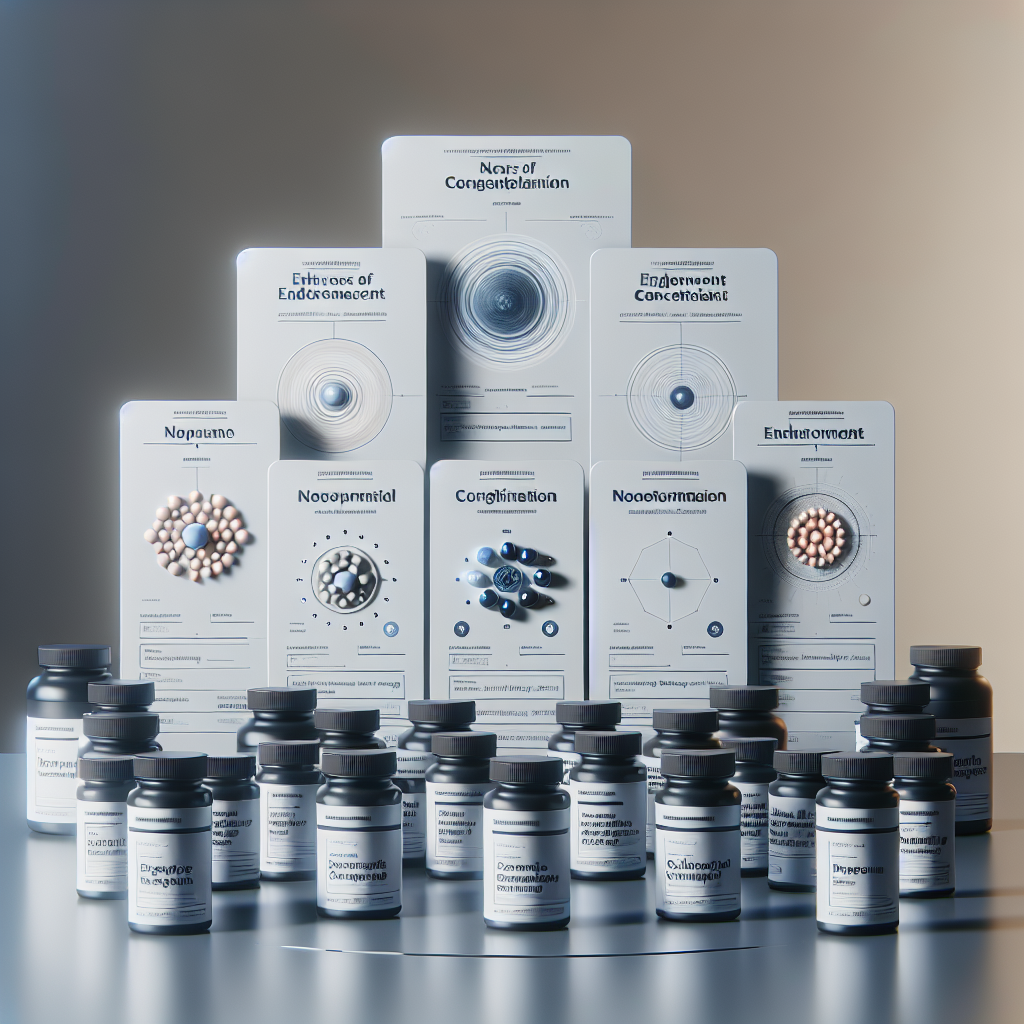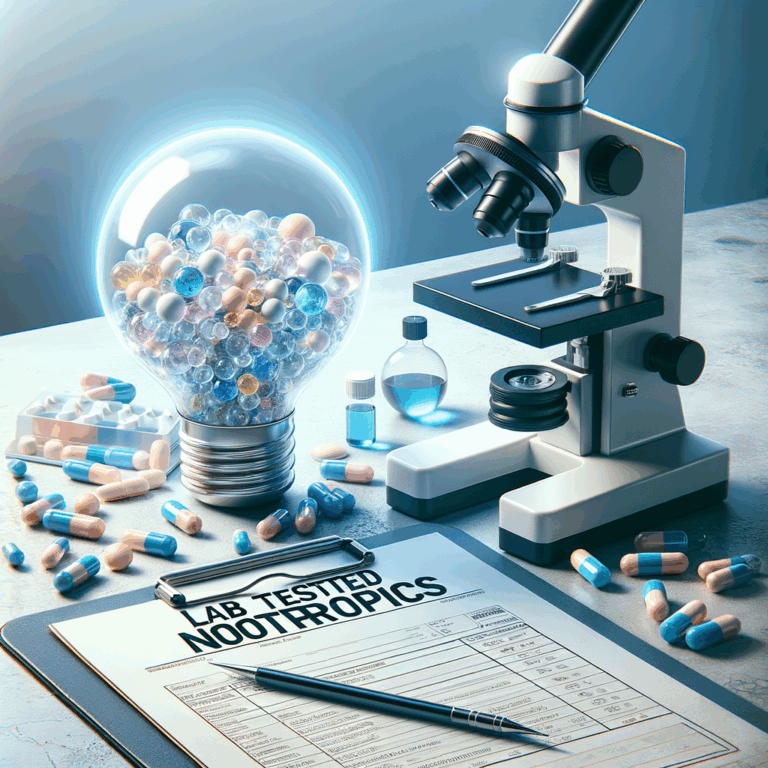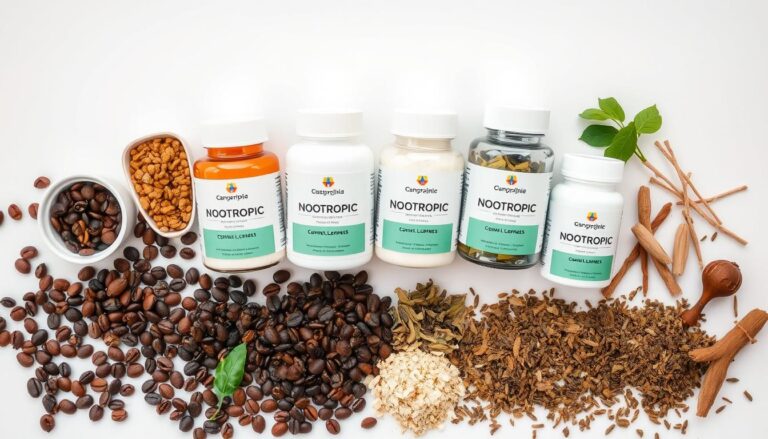
- Understanding Nootropics: The Brain-Boosting Wonders
- What Are Nootropics?
- Common Categories of Nootropics
- Top 10 Best Nootropics for Effortless Focus
- 1. Caffeine
- 2. L-Theanine
- 3. Rhodiola Rosea
- 4. Bacopa Monnieri
- 5. Piracetam
- 6. Creatine
- 7. Alpha-GPC
- 8. Lion’s Mane Mushroom
- 9. Modafinil
- 10. Ginkgo Biloba
- Choosing the Right Nootropic for You
- Factors to Consider
- Dosage and Cycle Recommendations
- Safety and Side Effects
- Combining Nootropics: The Art of Stacking
- Popular Stacks
- Lifestyle Factors Affecting Cognitive Function
- Frequently Asked Questions (FAQs)
- 1. Are nootropics safe for everyone?
- 2. How long does it take for nootropics to work?
- 3. Can I take nootropics every day?
- 4. What’s the best nootropic for studying?
- 5. Can nootropics improve mood?
- 6. What’s the difference between prescription and over-the-counter nootropics?
- 7. How do I know which nootropic is right for me?
- 8. Can I stack multiple nootropics together?
- 9. Are there any side effects I should worry about?
- 10. Where can I buy quality nootropics?
- Conclusion
- References
Understanding Nootropics: The Brain-Boosting Wonders
When you hear the term “nootropics,” it may evoke images of high-tech labs and futuristic brain enhancements. In reality, nootropics are simply substances designed to improve cognitive function. They can boost focus, enhance memory, and increase motivation. In our fast-paced world, many people want a mental edge. Whether you’re a student preparing for exams or a professional aiming to meet deadlines, the best nootropics can make a noticeable difference.
The term “nootropic” itself originates from the Greek words “nous,” meaning mind, and “tropein,” meaning to bend or turn. The concept first appeared in 1972 when a Romanian psychologist developed the compound Piracetam. Since then, numerous substances have entered this sphere. From herbal supplements to synthetic compounds, the nootropic landscape is vast and varied.
Let’s embark on a fascinating journey through the world of nootropics, focusing on the best options available. By the end of this guide, you’ll have a solid understanding of effective choices that can help you achieve effortless focus.
What Are Nootropics?
Nootropics, often called “smart drugs,” are substances enhancing cognitive functions, such as memory, creativity, and motivation. While some nootropics are available through prescriptions, others are over-the-counter supplements. It’s essential to understand their ingredients before incorporating them into your daily routine.
Generally, nootropics work by increasing the availability of neurotransmitters in the brain. These neurotransmitters are chemical messengers that help transmit signals between nerve cells. By facilitating communication between these cells, nootropics can improve a range of cognitive functions.
Common Categories of Nootropics
1. Natural Nootropics: These come from plant sources and are often deemed safer than synthetic alternatives.
2. Synthetic Nootropics: Man-made compounds often used for their potent effects on cognitive enhancement.
3. Racetams: A class of nootropics that includes popular choices like Piracetam and Aniracetam.
4. Cholinergics: Supplements that raise the levels of acetylcholine, a crucial neurotransmitter linked to memory and learning.
These categories encompass a broad spectrum of products designed to enhance cognition. Depending on your needs, there’s likely a nootropic that suits you perfectly.
Top 10 Best Nootropics for Effortless Focus
In this section, we’ll explore some of the best nootropics available. Each one has unique benefits that can help sharpen your focus and boost your cognitive abilities.
1. Caffeine
Caffeine is perhaps the most well-known stimulant. It’s a common ingredient in coffee, tea, and energy drinks. Studies show that caffeine effectively enhances attention and focus. It works by blocking adenosine, a neurotransmitter that promotes sleep. By doing so, caffeine helps you feel alert and energized.
Pros:
– Easily accessible
– Quick boost in energy
– Affordable
Cons:
– Can lead to jitters
– May cause insomnia if taken too late in the day
2. L-Theanine
Often paired with caffeine, L-Theanine is an amino acid derived from tea leaves. It promotes relaxation without causing drowsiness. Many users report improved focus and attention when combining L-Theanine with caffeine. This synergy results in a calming effect that balances caffeine’s stimulating properties.
Pros:
– Reduces anxiety
– Enhances focus when combined with caffeine
– Promotes a state of calm alertness
Cons:
– Effects may take longer to kick in compared to caffeine
3. Rhodiola Rosea
Rhodiola Rosea is an adaptogenic herb known for its stress-reducing properties. It helps the body adapt to stressors and improves mental performance, especially during intense cognitive tasks. Users often experience enhanced focus and endurance when under pressure.
Pros:
– Reduces fatigue
– Improves mental clarity
– Increases energy during stressful situations
Cons:
– May interact with certain medications
4. Bacopa Monnieri
Bacopa Monnieri is an ancient herbal remedy known to boost memory and cognitive function. Studies suggest it improves the speed of processing and memory recall. Regular use can lead to noticeable improvements in mental clarity and focus.
Pros:
– Supports long-term memory
– Enhances cognitive performance over time
– Generally well-tolerated
Cons:
– Effects may take weeks to become noticeable
5. Piracetam
Piracetam was the first nootropic ever developed. It enhances memory, improves learning, and boosts overall cognitive capacity. It works by modulating neurotransmitter release and improving brain circulation.
Pros:
– Enhances memory and learning
– Well-researched with numerous studies supporting its efficacy
Cons:
– May not be as effective for everyone
– Long-term use may require cycling
6. Creatine
While often associated with physical performance, creatine also benefits cognitive function. It supports energy production in brain cells, enhancing short-term memory and overall mental performance, especially in stressful situations.
Pros:
– Increases mental energy
– Supports brain health
– Safe for long-term use
Cons:
– Some may experience digestive issues
7. Alpha-GPC
Alpha-GPC is a choline compound that boosts acetylcholine levels in the brain. This neurotransmitter is linked to memory and learning. Many athletes use Alpha-GPC to enhance focus and cognitive performance during workouts.
Pros:
– Supports memory and learning
– Quick absorption and effect
Cons:
– Higher doses can lead to headaches
8. Lion’s Mane Mushroom
Lion’s Mane is a medicinal mushroom that stimulates nerve growth factor (NGF) synthesis. This can lead to improved cognitive function and increased focus. Users often report enhanced memory and mental clarity.
Pros:
– Natural ingredient
– Promotes brain health and neurogenesis
Cons:
– Can be costly compared to other options
9. Modafinil
Modafinil is a prescription medication primarily used to treat narcolepsy. However, many people use it off-label for its cognitive-enhancing properties. Studies suggest it improves alertness, focus, and overall cognitive function.
Pros:
– Effective for enhancing focus
– Long-lasting effects
Cons:
– Requires a prescription
– Potential side effects include headaches and anxiety
10. Ginkgo Biloba
Ginkgo Biloba has been used for centuries to improve cognitive function and memory. It increases blood flow to the brain, which can enhance cognition and mental performance.
Pros:
– Well-tolerated by most
– May improve memory and cognitive speed
Cons:
– Effects can vary from person to person
Choosing the Right Nootropic for You
Navigating the world of nootropics can feel overwhelming. The right choice depends on your personal needs and preferences. Start by considering your goals. Do you want to improve memory, increase focus, or reduce stress?
Factors to Consider
1. Purpose: Identify what cognitive function you want to improve.
2. Tolerance: Be mindful of how your body reacts to different substances.
3. Availability: Some nootropics are easily accessible, while others may require a prescription.
4. Interactions: Consider any medications you are currently taking.
Dosage and Cycle Recommendations
Every nootropic comes with specific dosage guidelines. It’s wise to start with lower doses and gradually increase them as needed. Many nootropics work best in cycles—taking them for a few weeks, then pausing for a while to avoid tolerance.
Safety and Side Effects
While many nootropics are considered safe, potential side effects can occur. It’s crucial to do your homework and consult with a healthcare professional before starting any new supplement. Furthermore, ensure you source products from reputable brands to avoid contaminants and mislabeling.
Some common side effects based on various nootropics include:
– Caffeine: Jitters, insomnia
– L-Theanine: Drowsiness in excessive doses
– Bacopa Monnieri: Mild digestive issues
– Modafinil: Headaches, anxiety
Keeping track of how these substances affect you can help you make informed decisions in the future.
Combining Nootropics: The Art of Stacking
Stacking refers to the practice of combining different nootropics to enhance their effects. Certain combinations can result in synergistic benefits, leading to improved focus, memory, and overall cognitive performance.
Popular Stacks
1. Caffeine and L-Theanine: This combination balances stimulation and relaxation, promoting enhanced focus with minimized jitteriness.
2. Piracetam with Alpha-GPC: Piracetam enhances cognition while Alpha-GPC provides the necessary choline for memory support.
3. Rhodiola and Bacopa Monnieri: This duo combines stress-resilience with memory enhancement, making it ideal during exam periods.
When creating a stack, it’s essential to start with one nootropic at a time. This approach allows you to monitor effects and isolate any problems that arise.
Lifestyle Factors Affecting Cognitive Function
Nootropics are not magic pills. They work best in conjunction with a healthy lifestyle. Here are some key factors to enhance cognitive performance:
1. Nutrition: A balanced diet supports brain health. Foods rich in omega-3 fatty acids, like fish and flaxseed, boost brain function.
2. Exercise: Regular physical activity increases blood flow and oxygen supply to the brain, enhancing cognitive performance.
3. Sleep: Quality sleep is crucial for memory consolidation and cognitive function. Aim for 7-9 hours each night.
4. Stress Management: Practices like meditation and yoga help reduce stress, allowing your mind to function better.
When paired with these healthy practices, nootropics can become powerful tools in your cognitive toolkit.
Frequently Asked Questions (FAQs)
1. Are nootropics safe for everyone?
Nootropics are generally safe for many individuals. However, those with pre-existing medical conditions or on medications should consult a healthcare professional.
2. How long does it take for nootropics to work?
The onset of effects varies by substance. Some, like caffeine, work within minutes, while others, like Bacopa Monnieri, may take weeks.
3. Can I take nootropics every day?
Many nootropics can be taken daily; however, cycling is recommended for some to prevent tolerance.
4. What’s the best nootropic for studying?
Caffeine and L-Theanine work well for sustained focus during study sessions, while Bacopa Monnieri supports long-term memory retention.
5. Can nootropics improve mood?
Certain nootropics, like Rhodiola Rosea, can enhance mood by reducing stress and fatigue.
6. What’s the difference between prescription and over-the-counter nootropics?
Prescription nootropics, like Modafinil, are typically more potent and used for specific medical conditions. Over-the-counter options are generally herbal supplements and milder cognitive enhancers.
7. How do I know which nootropic is right for me?
Identify your specific cognitive needs, research available options, and consider consulting with a healthcare professional.
8. Can I stack multiple nootropics together?
Yes, stacking is common. However, start with one at a time to gauge effects and address any side effects.
9. Are there any side effects I should worry about?
Side effects vary. Common ones include headaches, digestive issues, and jitteriness, depending on the nootropic.
10. Where can I buy quality nootropics?
Purchase nootropics from reputable brands and trusted retailers to ensure quality and safety. Always check for third-party testing and certifications.
Conclusion
Nootropics offer a fascinating world of potential cognitive enhancements. From boosting focus to enhancing memory, the best nootropics can empower your everyday performance. Whether you’re facing a busy workday or studying for exams, these substances might just provide the extra advantage you need.
Explore the different options, consult with professionals if necessary, and keep track of how they affect you. Your brain deserves the best support you can give it, and with the right nootropics, you can unlock your full cognitive potential.
References
– Examine.com – Nootropics
– Healthline – The Effects of Nootropics
– WebMD – Nootropics and Cognitive Enhancement
– Psychology Today – Benefits of Nootropics



